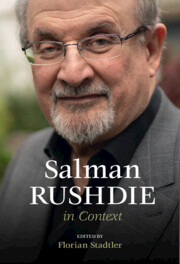Book contents
- Salman Rushdie in Context
- Salman Rushdie in Context
- Copyright page
- Dedication
- Contents
- Contributors
- Acknowledgements
- Introduction
- Part I Life
- Chapter 1 Salman Rushdie, Biography, and Autobiography
- Chapter 2 Salman Rushdie and the Fatwa
- Chapter 3 Archival Rushdie
- Chapter 4 Salman Rushdie as Public Intellectual
- Part II Literary and Creative Contexts
- Part III Historical and Cultural Contexts
- Part IV Critical Theoretical Contexts
- Part V Reception, Criticism, and Adaptation
- Works by Salman Rushdie
- Select Bibliography
- Index
Chapter 2 - Salman Rushdie and the Fatwa
from Part I - Life
Published online by Cambridge University Press: 23 March 2023
- Salman Rushdie in Context
- Salman Rushdie in Context
- Copyright page
- Dedication
- Contents
- Contributors
- Acknowledgements
- Introduction
- Part I Life
- Chapter 1 Salman Rushdie, Biography, and Autobiography
- Chapter 2 Salman Rushdie and the Fatwa
- Chapter 3 Archival Rushdie
- Chapter 4 Salman Rushdie as Public Intellectual
- Part II Literary and Creative Contexts
- Part III Historical and Cultural Contexts
- Part IV Critical Theoretical Contexts
- Part V Reception, Criticism, and Adaptation
- Works by Salman Rushdie
- Select Bibliography
- Index
Summary
This chapter considers the wider implications of The Satanic Verses affair and the fatwa. It engages with Rushdie’s considerations of Islam, secularism, and the complexities of geopolitical leadership of the Muslim world. The chapter also explores the wider questions and implications of freedom of expression that have been raised in Europe especially at the time and structured Britain’s relationship with Iran between 1989 and 1998. The chapter examines Rushdie’s own responses to the fatwa, collected in the final sections in his essay collection Imaginary Homelands as well as considering responses from Muslim literary critics and writers, some of whom supported Rushdie, others who spoke out against him, to illuminate the wider public debates around freedom of expression, secularism, and faith, which have proved central to a consideration of Rushdie’s work.
Keywords
- Type
- Chapter
- Information
- Salman Rushdie in Context , pp. 26 - 38Publisher: Cambridge University PressPrint publication year: 2023

